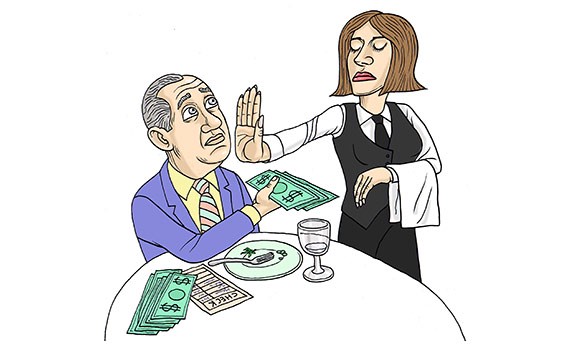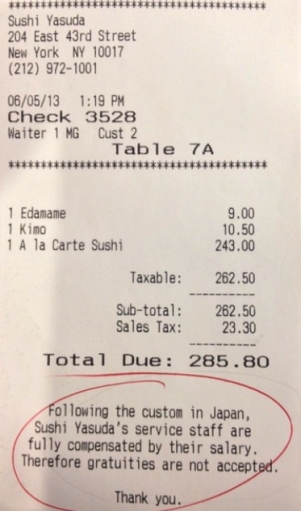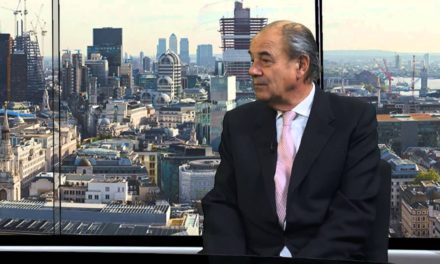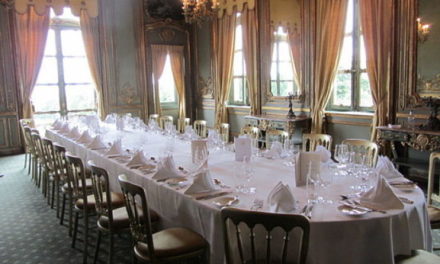The age old argument about tips in restaurants and hotels is a perennial one. Whether to tip or not has long been a discussion: Why do you tip? What constitutes meriting a tip? Do you just tip out of habit? Or do you just not tip at all? But the bigger problem arises when the question; “Where do the tips go and who gets them?” comes up. There is no standard equation. Normally small places with a handful of staff just split it equally. Owners tend not to take any tips, even the ones that play and active role in the day to day running. Some owners take a percentage to cover breakages and credit card charges — very fair in my opinion. I knew a very successful company here on the Coast that used to take 1/3 of the tips for the house and then distribute the rest. In my heady days in hotels there was always a 10%/12.5% service charge added to all hotel bills which was then distributed amongst every member of staff no matter what position they held. The trouble with this system was that invariably the ‘House’ took 50% towards wages costs and then distributed the rest.
 Michel Roux, from Le Gavroche, one of London’s premiere restaurants once the holder of three Michelin stars under the guidance of its original family team of Albert and Michel Roux, has turned the whole debate on its head. In true controversial style, last year Michel removed his 13% service charge from his menus. In a bid to explain this move he claimed that the addition of a service charge confuses the clients as they believe it to be a tip!! Well hang on a bit Michel, I think the majority of diners probably do, especially when the words ‘optional’ or ‘voluntary’ are added to the words ‘service charge’!
Michel Roux, from Le Gavroche, one of London’s premiere restaurants once the holder of three Michelin stars under the guidance of its original family team of Albert and Michel Roux, has turned the whole debate on its head. In true controversial style, last year Michel removed his 13% service charge from his menus. In a bid to explain this move he claimed that the addition of a service charge confuses the clients as they believe it to be a tip!! Well hang on a bit Michel, I think the majority of diners probably do, especially when the words ‘optional’ or ‘voluntary’ are added to the words ‘service charge’!
But nowadays, to my knowledge and professional experience adding a 10% ‘optional service  charge for parties of seven or more’ is fairly common practice — and it does get added to the tips and is distributed as such. When explained as a charge that includes the preparation, presentation and service of food I would have thought that was part of the workload of a restaurant. After all I can’t ever remember going to have a suit made and the tailor telling me it was 300 pounds for the suits and 15% service charge for making it!!
charge for parties of seven or more’ is fairly common practice — and it does get added to the tips and is distributed as such. When explained as a charge that includes the preparation, presentation and service of food I would have thought that was part of the workload of a restaurant. After all I can’t ever remember going to have a suit made and the tailor telling me it was 300 pounds for the suits and 15% service charge for making it!!
So guests at Le Gavroche now can leave a tip without being encumbered with deciding to leave a voluntary or optional service charge — not tip!! — as Michel Roux explains:
“For me, tipping and service charge are two different things but by removing the service charge and incorporating it into the cost of the menu then it is clear, clean, and unambiguous. And then if diners wish to leave a tip on top of that it is up to them. I think this is something we should do in the restaurant industry. It is not clear for the customer whether or not they should leave extra on the table or whether or not it is going to all the staff or how it is being distributed. I daresay some restaurateurs have been abusing that.”
Ahhhh! Now I get it! It ain’t voluntary any more — you’ve got to pay it!! Oh well, you win some, you lose some!!
However, the British Prime Minister, Theresa May has now brought the argument to the statute books! In October at the Conservative Party Conference she stated that restaurants will be banned from making any deductions from staff tips under new legislation to be introduced “at the earliest opportunity”.

Kate Nicholls CEO of UK Hospitality
 The Prime Minister said “tough” new legislation would be introduced in a bid to tackle poor working practises.
The Prime Minister said “tough” new legislation would be introduced in a bid to tackle poor working practises.
She explained: “We will introduce tough new legislation to ensure that workers get to keep all of their tips – banning employers from making any deductions.
UK Hospitality chief executive Kate Nicholls warned against legislation that would place an addition burden on businesses at an already difficult time. She said: “The hospitality sector took immediate voluntary action to improve transparency and address concerns around the treatment of tips when the issue was first raised. UK Hospitality and Unite have developed an industry code of practice which deals with the fair distribution of tips among all staff, not just waiters. As a result, best practice has been widely promoted across the sector.
“Some smaller businesses may retain a small proportion of tips to cover the costs of credit card charges and processing payments – but this is a small amount and the practice has been approved by Unite. At a time when costs are mounting for operators in the sector, the government must be careful about introducing additional legislation. There is no evidence that further legislation, which may have unforeseen consequences for staff, is necessary at this time.”
The announcement comes more than two years after a consultation into tips, service charges and troncs was led by then business secretary Sajid Javid.
A statement from the department of business, energy and industrial strategy said: “Unemployment is at its lowest since the 1970s and wages are rising. This legislation will ensure workers get the tips they deserve and give consumers reassurance that the money they leave in good faith to reward good service is going to the staff, as they intended – ensuring that hard work is rewarded.”

IN JAPAN TIPPING IS NOT PERMITTED
a custom adopted in some Japanese restaurants around the world











